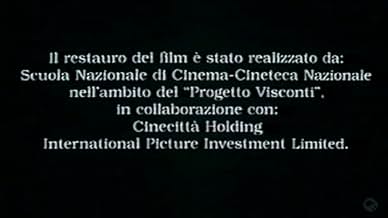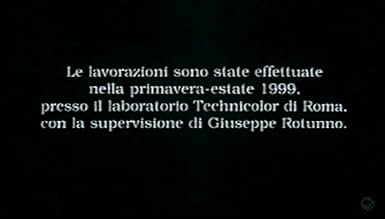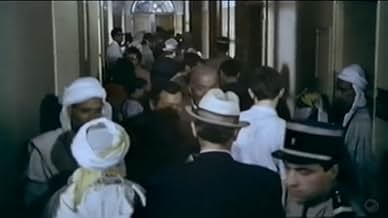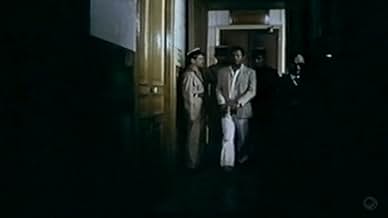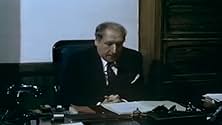AVALIAÇÃO DA IMDb
7,1/10
3,4 mil
SUA AVALIAÇÃO
Um homem enfrenta um julgamento por homicídio. O tribunal é tendencioso pelas suas qualidades pessoais.Um homem enfrenta um julgamento por homicídio. O tribunal é tendencioso pelas suas qualidades pessoais.Um homem enfrenta um julgamento por homicídio. O tribunal é tendencioso pelas suas qualidades pessoais.
- Direção
- Roteiristas
- Artistas
- Prêmios
- 4 indicações no total
Jean-Pierre Zola
- Employer
- (as Jean Pierre Zola)
Avaliações em destaque
The tragedy of Lo straniero (The Stranger) is accentuated by the terrific performance of Marcello Mastroianni who looks totally in character of Albert Camus's anti-hero in the popular novel on absurdism, nihilism, and apathy as well as by the linear, straightforward storytelling that is true to the novel and by the haunting score that just helps it conclude itself as a social drama that reflects the sometimes unbiased yet righteous-looking wisdom of the society. TN.
(Watched for free on YouTube.)
(Watched for free on YouTube.)
The stranger is very famous novel of the French literature writen by Albert Camus who tells the story of the murder of a man and then the arrest and the trial of his murderer.To adapt this novel for the cinema is a great challenge , at first sight the story seems easy to understand, but later we can hardly understand why Arthur Meursault killed the young Arab , why he doesn't try to defend himself.
The film directed by Luchino Visconti is really a good adaptation of that novel and Marcello Mastroianni 's performance is excellent.
10ted-129
Visconti brings to life the Camus novel with the minimum of dialog and surreal visuals.
Algiers sweats. The sun's glare beats down and doesn't let up--right up to the courtroom scene where one watches a dazed Mastroianni in the foreground while the fans of the jury members move in constant motion in a soft-focus background. Much of the film has a dreamlike feel that fuses with the existential blankness felt by Mastroianni's character.
I recall this film playing frequently in San Francisco at the Times Theater back in the early stoner 70's. And with the 70's, this film has all but disappeared. One only hopes that all of Visconti's films will someday make it to DVD--but especially The Stranger!
Algiers sweats. The sun's glare beats down and doesn't let up--right up to the courtroom scene where one watches a dazed Mastroianni in the foreground while the fans of the jury members move in constant motion in a soft-focus background. Much of the film has a dreamlike feel that fuses with the existential blankness felt by Mastroianni's character.
I recall this film playing frequently in San Francisco at the Times Theater back in the early stoner 70's. And with the 70's, this film has all but disappeared. One only hopes that all of Visconti's films will someday make it to DVD--but especially The Stranger!
Inspired by Albert Camus' seminal work of 1942, one is hardly likely to see a more faithful or indeed reverential adaptation than this.
It is easy to get bogged down in discussions as to whether or not Camus' piece is Existentionalist. He himself denied this and it is probably safer to say that if anything, it represents the philosophy of the Absurd.
The novel is written as a first person narrative by the 'Stranger' of the title although I have always felt the alternative title of 'The Outsider' to be far more appropriate. Arthur Meursault by name, he is the sheikh of apathy and his total indifference is evident in both his manner and such utterings as "It doesn't really matter" or "It makes no difference one way or the other." He cannot bring himself to show any grief at his mother's funeral and reacts impassively to his adoring girlfriend's suggestion of marriage. He is even unable to give a reason for his apparently motiveless shooting of an Arab other than "I think it was the sun." He simply does not behave as society dictates he ought and for his inability to play the game he pays the ultimate penalty.........
I cannot agree with the view that Marcello Mastroianni is miscast in the role. He had previously worked with Visconti in the cruelly underrated 'Le Notte Bianchi' of 1957 and during the intervening years he had become the finished article and excelled for Fellini, Antonioni, Bolognini, Germi and de Sica. Very few actors convey blankness or lassitude quite as well as he which makes his final rant against the religious platitudes of the prison chaplain so dramatically effective. By all accounts he lobbied for the role and turns in a splendid performance.
Visconti is the most 'operatic' of directors which is why he seems an odd choice for this austere, almost Bresson-esque material. He has of course the services of a fine cast, notably a touching Anna Karina as Meursault's lover, Georges Geret as a pimp, Bernard Blier as Meursault's feeble defence lawyer, Georges Wilson as an evangelical examining magistrate and Bruno Cremer as the prison chaplain.
The sun-baked imagery and oppressive heat are wonderfully captured by Visconti's chosen cinematographer Giuseppe Rotunno whilst Piero Piccioni, much favoured by Bolognini, contributes one of his most offbeat scores.
This is not really to do with plot but is all about 'mood'. Both novel and film are pervaded by a sense of 'Ennui', that evocative word that covers so many negative emotions.
The ultimate challenge is to make a film about boredom without its being boring. Has Visconti succeeded? On balance, with minor reservations, I think he has.
It is easy to get bogged down in discussions as to whether or not Camus' piece is Existentionalist. He himself denied this and it is probably safer to say that if anything, it represents the philosophy of the Absurd.
The novel is written as a first person narrative by the 'Stranger' of the title although I have always felt the alternative title of 'The Outsider' to be far more appropriate. Arthur Meursault by name, he is the sheikh of apathy and his total indifference is evident in both his manner and such utterings as "It doesn't really matter" or "It makes no difference one way or the other." He cannot bring himself to show any grief at his mother's funeral and reacts impassively to his adoring girlfriend's suggestion of marriage. He is even unable to give a reason for his apparently motiveless shooting of an Arab other than "I think it was the sun." He simply does not behave as society dictates he ought and for his inability to play the game he pays the ultimate penalty.........
I cannot agree with the view that Marcello Mastroianni is miscast in the role. He had previously worked with Visconti in the cruelly underrated 'Le Notte Bianchi' of 1957 and during the intervening years he had become the finished article and excelled for Fellini, Antonioni, Bolognini, Germi and de Sica. Very few actors convey blankness or lassitude quite as well as he which makes his final rant against the religious platitudes of the prison chaplain so dramatically effective. By all accounts he lobbied for the role and turns in a splendid performance.
Visconti is the most 'operatic' of directors which is why he seems an odd choice for this austere, almost Bresson-esque material. He has of course the services of a fine cast, notably a touching Anna Karina as Meursault's lover, Georges Geret as a pimp, Bernard Blier as Meursault's feeble defence lawyer, Georges Wilson as an evangelical examining magistrate and Bruno Cremer as the prison chaplain.
The sun-baked imagery and oppressive heat are wonderfully captured by Visconti's chosen cinematographer Giuseppe Rotunno whilst Piero Piccioni, much favoured by Bolognini, contributes one of his most offbeat scores.
This is not really to do with plot but is all about 'mood'. Both novel and film are pervaded by a sense of 'Ennui', that evocative word that covers so many negative emotions.
The ultimate challenge is to make a film about boredom without its being boring. Has Visconti succeeded? On balance, with minor reservations, I think he has.
A naked room, a dead old woman lies on a wooden coffin, across the coffin we see her son. His head down, his face slightly contorted. We move in to notice with a chill that he's just trying to get some dirt from under his fingernails. Mersault. Visconti's Mersault inspired by Camus's Mersault. The film was attacked in its day and the Albert Camus's purists shouted blue murder or worse, they didn't say a word. Visconti knew what he was doing. He chose Marcelo Mastroianni to play Mersault. By that choice alone he was departing from Camus's intentions and yet, if you read the book today and see the film today, Mastroianni is Camus's Mersault. It is the driest of all Visconti films. His toughest. Mastroianni gives a performance that defies description. If you've seen more than once,"XXX" by choice, I don't promise you that you'll surrender, automatically, to the power of this film, but I can assure you that both films belong to the same Universe, yours, ours. Give it a try. Then, you tell me.
Você sabia?
- CuriosidadesTwenty years before Visconti's adaptation, while Camus was still alive, the novelist had been approached with the idea of making The Stranger as a film by director Jean Renoir.
- Cenas durante ou pós-créditosThe restoration of the film was carried out by: the National Film School - National Film Library, as part of the 'Visconti Project' in collaboration with Cinecitta Holding International Picture Investment Limited. The work was carried out in the spring & summer 1999, at the Technicolor Laboratory in Rome, under the supervision of Giuseppe Rotunno.
- ConexõesReferenced in Costumes from the Films of Visconti (1978)
Principais escolhas
Faça login para avaliar e ver a lista de recomendações personalizadas
- How long is The Stranger?Fornecido pela Alexa
Detalhes
- Data de lançamento
- Países de origem
- Idiomas
- Também conhecido como
- The Stranger
- Locações de filme
- Empresas de produção
- Consulte mais créditos da empresa na IMDbPro
Contribua para esta página
Sugerir uma alteração ou adicionar conteúdo ausente

Principal brecha
By what name was O Estrangeiro (1967) officially released in Canada in English?
Responda
